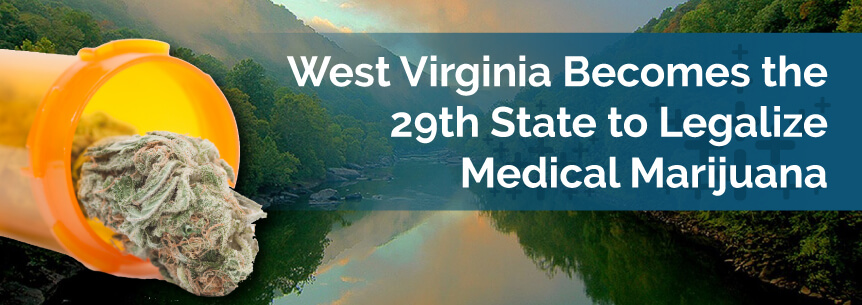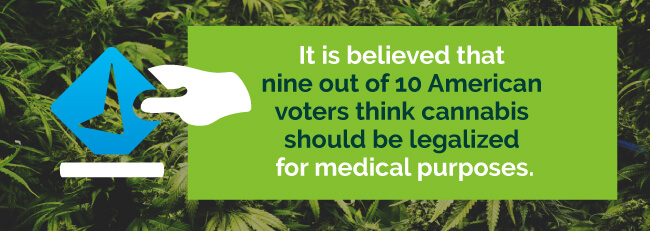
It’s confirmed: West Virginia has officially joined the ranks of states that have legalized medical marijuana.
On April 6, Gov. Jim Justice signed a bill that made West Virginia the 29th state to allow the use of cannabis for medical purposes. West Virginia is the sixth state to legalize marijuana since 2016 and the third state, together with Pennsylvania and Ohio, to approve the bill through legislation. In the other three states — Florida, North Dakota and Arkansas — medical marijuana was legalized through ballot approval.
The West Virginia Medical Cannabis Act, also known as SB 386, was first introduced by Sen. Richard Ojeda. Unfortunately, it was significantly weakened in the House before finally receiving approval in the first week of April. According to the new law, the Bureau of Public Health is charged with the responsibility of regulating medical marijuana processors, growers and dispensaries.
Speaking to the press after the monumental day in West Virginia, Gov. Justice stated: ”West Virginia residents are very compassionate people, and this law is meant to help those who are struggling with debilitating illnesses. How could we turn our backs on a loved one who is suffering? This is an ideal vehicle for our doctors to help the people.’’
The new law recognizes cannabis as a treatment for patients with any of the 14 pre-approved conditions. Including:
Patients with a marijuana recommendation from their doctors can obtain the medicine from state-regulated dispensaries in the form of gels, creams, pills, oils, tinctures, liquids, ointments and vaporizable extracts. The state doesn’t allow dispensaries to sell smokable buds or marijuana edibles. It only allows patients to prepare them at their homes. It also doesn’t allow home cultivation, but patients can only legally possess up to one month’s supply at any given time.
Matt Simon of the Marijuana Policy Project believes the law is going to help many patients and families in West Virginia for years to come. He says medical marijuana is useful for the treatment of a wide variety of debilitating medical conditions as well as symptoms.
He goes on to say that medical cannabis is one of the most powerful pain relievers, and is far less addictive and less harmful than most of the prescription drugs available on the market today. Providing West Virginia patients with a safer alternative to drugs such as opioids is a godsend treatment for the state.
One problem with the West Virginia law, however, is a new regulation for driving under the influence of cannabis. This law equates impairment with being caught with a THC level of 3 nanograms per milliliter of blood. To some critics, this limit is quite unfair.
It’s even lower than the 5-nanogram limitation that was adopted in states such as Washington, where marijuana is legalized for recreational use. In fact, West Virginia’s Driving Under Influence law could make it impossible for some patients to drive. THC levels are usually at this amount or even higher for hours and days after taking the last dose.
West Virginia’s regulations put the state on the less permissive end of the medical marijuana spectrum that ranges from highly restrictive, like the case of New York, and highly permissive, like the case of California. Although the program bans smokable marijuana, it’s still a significant step forward in the overall cannabis legalization program and the cannabis industry.
It is believed that nine out of 10 American voters think cannabis should be legalized for medical purposes. There’s a lot of evidence indicating that medical cannabis can help opioid users ease their pain in a more efficient way, resulting in lower doses of this potentially dangerous narcotic.

In some cases, marijuana can successfully replace opioids in pain management. Given this information, it’s only safe to say that West Virginia’s legalization of medical marijuana could significantly lessen the risk of overdose and deaths from opioid use.
Americans for Safe Access (ASA) applauds West Virginia, saying the legalization of medical cannabis is a case in point of how lawmakers are doing their best to ensure people who are suffering get access to medication.
While there was no suggestion that the legislators would ever put forward a medical marijuana bill before the 60-day session, it finally came to be. The bill first popped up on March 24 during a Senate Health Committee meeting, where it garnered a 6 to 5 vote. It later passed the Senate on March 29 with a vote of 28 to 6.
However, members of the House voted to make the law a little more restrictive. Among other things, it was amended to ban the smoking of cannabis, home cultivation, and sale and purchase of edible weed. It later passed the House on April 4 with a vote of 76 to 24, and the Senate approved it the following day with a vote of 26 to 6.
Bill sponsor Ojeda told the News that moving the bill to approval was a difficult task. He attributes the signing of the bill to the efforts of so many people who were passionate about helping those who are suffering. “It was a fight to get this through the Senate. I had to ask Sen. Carmichael to intervene to get it put on these committees and when it did, it was still tough.”
There are now 47 states with some medical cannabis legislation in place, and 29 of these states have put in place effective medical marijuana laws. An additional 18 states have enacted medical marijuana laws, but their regulations are somewhat ineffective because they are too restrictive or unworkable. Only three states — Kansas, Idaho and Indiana — have not made any efforts toward the legalization of medical marijuana yet.
The Bureau of Public health in West Virginia is set to begin issuing marijuana patient identification cards beginning July 1, 2019, when sales will begin. It’s expected that it will allow up to 10 growers and 30 dispensaries in the state.
No Information on MarijuanaDoctors.Com should be used to diagnose, treat, prevent or cure any disease or condition. You can view our Full Disclaimer here.